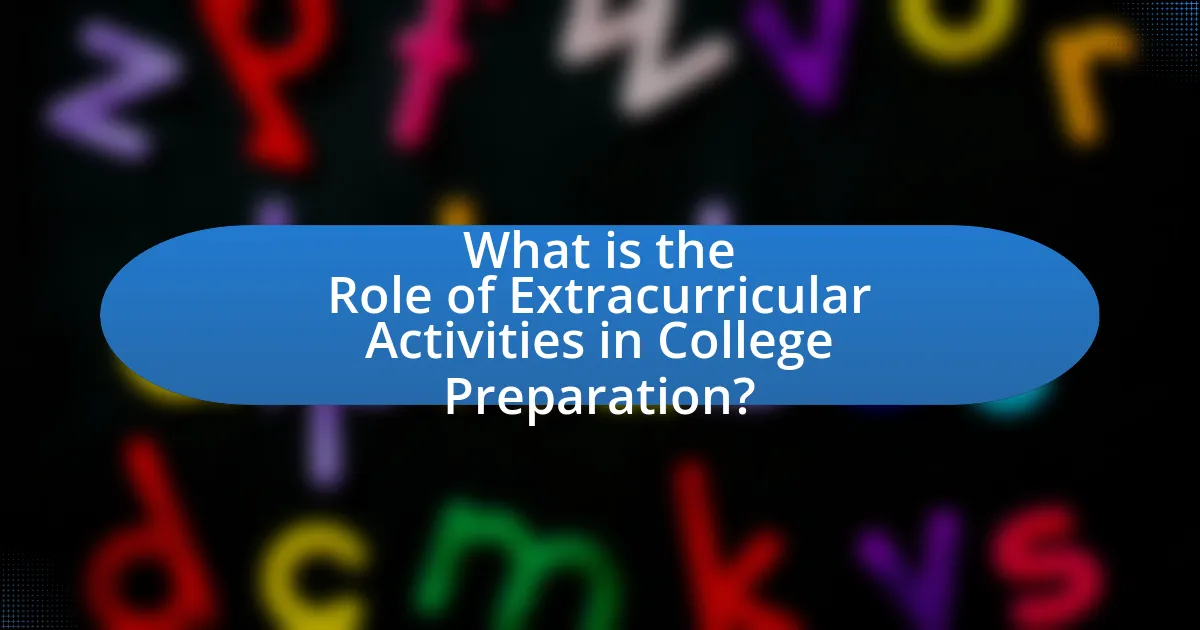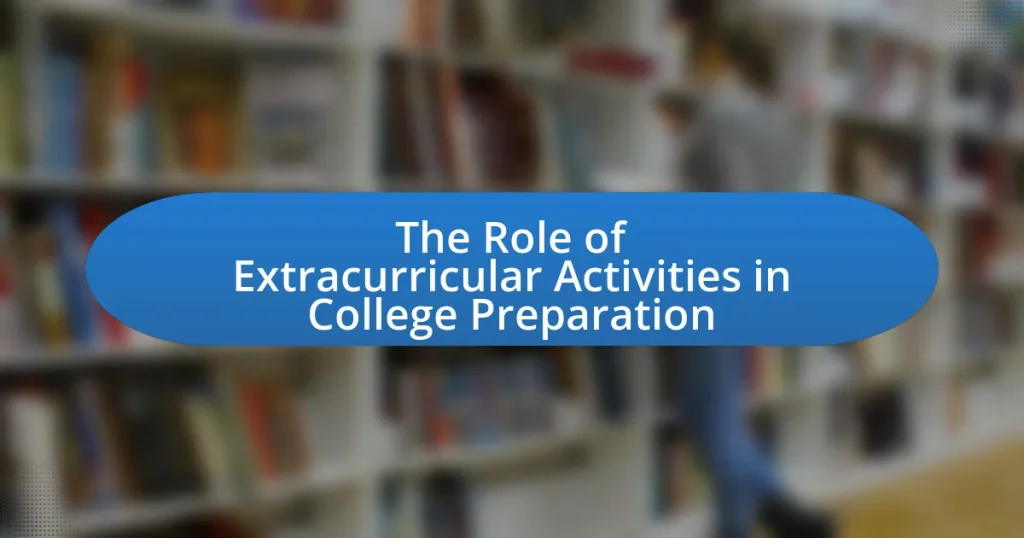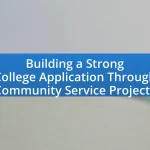Extracurricular activities are essential in college preparation, significantly enhancing students’ skills, experiences, and profiles sought by colleges. These activities foster critical skills such as leadership, teamwork, and time management, which are highly valued in college admissions. Research indicates that 70% of colleges consider extracurricular involvement a significant factor in their admissions decisions, highlighting the importance of a well-rounded application. The article explores how participation in various extracurricular activities contributes to college readiness, academic success, and personal growth, while also addressing the challenges students face in balancing these commitments with their academic responsibilities.

What is the Role of Extracurricular Activities in College Preparation?
Extracurricular activities play a crucial role in college preparation by enhancing students’ skills, experiences, and profiles that colleges seek. Participation in these activities fosters essential skills such as leadership, teamwork, and time management, which are highly valued in college admissions. For instance, a study by the National Association for College Admission Counseling found that 70% of colleges consider extracurricular involvement as a significant factor in their admissions decisions. Additionally, these activities provide opportunities for students to explore interests, develop passions, and build a network, all of which contribute to a well-rounded college application.
How do extracurricular activities contribute to college readiness?
Extracurricular activities contribute to college readiness by enhancing essential skills such as time management, teamwork, and leadership. Participation in these activities allows students to balance academic responsibilities with other commitments, fostering organizational skills crucial for college success. Research indicates that students involved in extracurriculars are more likely to develop a sense of belonging and community, which can improve their emotional well-being and academic performance. For instance, a study published in the Journal of Educational Psychology found that students engaged in extracurricular activities had higher GPAs and were more likely to pursue higher education. This correlation underscores the importance of extracurricular involvement in preparing students for the demands of college life.
What skills do students develop through participation in extracurricular activities?
Students develop a variety of skills through participation in extracurricular activities, including leadership, teamwork, time management, and communication skills. Leadership skills are honed as students take on roles within clubs or teams, guiding peers and making decisions. Teamwork is fostered through collaborative projects and group activities, where students learn to work effectively with others towards common goals. Time management skills are enhanced as students balance academic responsibilities with extracurricular commitments, teaching them to prioritize tasks efficiently. Communication skills are improved through presentations, discussions, and interactions with diverse groups, preparing students for future professional environments. Research indicates that students involved in extracurricular activities often demonstrate higher levels of engagement and academic performance, further validating the importance of these skills in their overall development.
How do these skills translate to academic success in college?
Extracurricular activities enhance skills that directly contribute to academic success in college. Participation in these activities fosters time management, teamwork, and leadership abilities, which are essential for navigating the demands of college coursework. For instance, a study by the National Center for Education Statistics found that students involved in extracurricular activities tend to have higher GPAs and graduation rates compared to those who are not. This correlation indicates that the skills developed through extracurricular engagement, such as effective communication and problem-solving, translate into improved academic performance and a greater likelihood of achieving educational goals.
Why are extracurricular activities important for college applications?
Extracurricular activities are important for college applications because they demonstrate a student’s interests, skills, and commitment beyond academics. Colleges seek well-rounded individuals who can contribute to campus life, and participation in clubs, sports, or volunteer work showcases leadership, teamwork, and time management abilities. Research from the National Association for College Admission Counseling indicates that 70% of colleges consider extracurricular involvement as a significant factor in admissions decisions, highlighting its relevance in evaluating a candidate’s overall profile.
What do admissions officers look for in a student’s extracurricular involvement?
Admissions officers look for depth, commitment, and leadership in a student’s extracurricular involvement. They assess how long a student has participated in activities, the level of responsibility taken, and the impact made within those activities. For instance, a student who has held leadership positions or initiated projects demonstrates not only dedication but also the ability to influence and contribute positively to their community. Research indicates that 70% of admissions officers consider leadership roles in extracurricular activities as a significant factor in their decision-making process, highlighting the importance of active engagement and personal growth through these experiences.
How can extracurricular activities enhance a student’s personal statement?
Extracurricular activities can enhance a student’s personal statement by showcasing their skills, interests, and commitment to personal growth. These activities provide concrete examples of leadership, teamwork, and time management, which are qualities that admissions committees value. For instance, participation in sports can demonstrate discipline and resilience, while involvement in clubs can highlight collaboration and initiative. Research indicates that students who engage in extracurricular activities often have higher academic performance and better college readiness, as noted in a study by the National Center for Education Statistics, which found that students involved in such activities are more likely to pursue higher education. Thus, including these experiences in a personal statement can create a compelling narrative that distinguishes a student from others.
What types of extracurricular activities are most beneficial for college preparation?
Participating in leadership roles, academic clubs, community service, and sports are the most beneficial extracurricular activities for college preparation. Leadership roles, such as student government or club president, develop essential skills like decision-making and teamwork, which colleges value. Academic clubs, including debate or science clubs, enhance critical thinking and subject mastery, making students more competitive. Community service demonstrates commitment and social responsibility, traits that colleges seek in applicants. Additionally, involvement in sports promotes discipline and time management, important attributes for college success. Research by the National Association for College Admission Counseling indicates that these activities positively influence college admissions decisions, highlighting their importance in the preparation process.
Which academic clubs and organizations should students consider joining?
Students should consider joining academic clubs such as debate club, science club, math club, and honor societies. These organizations provide opportunities for skill development, networking, and enhancing college applications. For instance, participation in a debate club can improve public speaking and critical thinking skills, while involvement in a science club can foster collaboration on projects and experiments. Honor societies, like the National Honor Society, recognize academic excellence and leadership, which can be advantageous for college admissions. Engaging in these clubs not only enriches students’ educational experiences but also demonstrates commitment and passion in specific academic areas, making them more appealing candidates to colleges.
How do sports and arts programs contribute to a well-rounded college application?
Sports and arts programs enhance a college application by demonstrating a student’s commitment, teamwork, and creativity. Participation in sports showcases physical discipline, leadership skills, and the ability to work collaboratively, which are qualities valued by colleges. Similarly, involvement in arts programs reflects creativity, dedication, and the ability to express oneself, traits that contribute to a diverse campus environment. Research indicates that students engaged in extracurricular activities, including sports and arts, often exhibit higher academic performance and better time management skills, further strengthening their applications.
How can students effectively balance extracurricular activities with academic responsibilities?
Students can effectively balance extracurricular activities with academic responsibilities by prioritizing time management and setting clear goals. Implementing a structured schedule that allocates specific time blocks for studying, attending classes, and participating in extracurriculars allows students to maintain focus and productivity. Research indicates that students who use planners or digital calendars report higher academic performance and reduced stress levels, as they can visualize their commitments and deadlines. Additionally, engaging in activities that align with academic interests can enhance learning and retention, making the balance more manageable.
What strategies can students use to maximize the impact of their extracurricular involvement?
Students can maximize the impact of their extracurricular involvement by strategically selecting activities that align with their academic and career goals. Engaging in leadership roles within these activities enhances skills such as teamwork, communication, and problem-solving, which are highly valued by colleges and employers. For instance, a study by the National Association for College Admission Counseling found that 70% of college admissions officers consider extracurricular activities as a significant factor in their decision-making process. Additionally, students should seek opportunities for reflection and skill development within their chosen activities, ensuring they can articulate their experiences and the lessons learned during college applications and interviews.

How do extracurricular activities foster personal growth and development?
Extracurricular activities foster personal growth and development by enhancing skills such as teamwork, leadership, and time management. Participation in these activities allows individuals to engage in diverse experiences that challenge them outside of academic settings. For instance, students involved in sports learn discipline and collaboration, while those in clubs develop organizational and communication skills. Research from the National Center for Education Statistics indicates that students who participate in extracurricular activities are more likely to report higher levels of self-esteem and social skills. This evidence supports the notion that such activities contribute significantly to personal development during formative years.
What role do leadership opportunities in extracurricular activities play in personal development?
Leadership opportunities in extracurricular activities significantly enhance personal development by fostering essential skills such as teamwork, communication, and problem-solving. Engaging in leadership roles allows individuals to practice decision-making and responsibility, which are critical for personal growth. Research indicates that students involved in leadership positions report higher self-esteem and improved interpersonal skills, as evidenced by a study published in the Journal of Educational Psychology, which found that participation in extracurricular leadership roles correlates with increased confidence and social competence. These experiences not only prepare students for future academic and career challenges but also contribute to their overall character development.
How can students cultivate leadership skills through these activities?
Students can cultivate leadership skills through extracurricular activities by taking on roles that require responsibility, decision-making, and teamwork. Engaging in student government, for example, allows students to practice organizing events, leading peers, and advocating for their interests, which enhances their ability to influence and motivate others. Participation in team sports fosters collaboration and communication, essential traits for effective leadership. Additionally, involvement in clubs or organizations that focus on community service helps students develop empathy and social awareness, further strengthening their leadership capabilities. Research indicates that students who participate in such activities are more likely to demonstrate leadership qualities in academic and professional settings, as they gain practical experience in managing projects and leading diverse groups.
What are the long-term benefits of developing leadership skills in college preparation?
Developing leadership skills during college preparation offers long-term benefits such as enhanced career opportunities, improved interpersonal skills, and increased self-confidence. These skills are crucial as they prepare students for future roles in the workforce, where leadership is often a key factor in career advancement. Research indicates that individuals with strong leadership abilities are more likely to secure managerial positions and experience higher job satisfaction. For instance, a study by the Center for Creative Leadership found that 70% of leaders attribute their success to the leadership skills they developed in early life, including during college. Additionally, leadership training fosters teamwork and communication skills, which are essential in collaborative work environments. Thus, the cultivation of leadership skills in college not only aids in personal development but also significantly enhances professional prospects.
How do extracurricular activities promote social skills and networking?
Extracurricular activities promote social skills and networking by providing structured environments where individuals can interact, collaborate, and build relationships. Participation in clubs, sports, or volunteer organizations encourages teamwork, communication, and conflict resolution, which are essential components of social skills. For instance, a study published in the Journal of Educational Psychology found that students involved in extracurricular activities reported higher levels of social competence and peer relationships compared to those who did not participate. This engagement fosters networking opportunities, as students connect with peers, mentors, and professionals, enhancing their social capital and future career prospects.
What types of social interactions occur in extracurricular settings?
Extracurricular settings facilitate various types of social interactions, including collaborative teamwork, peer mentoring, and networking opportunities. Collaborative teamwork occurs when students engage in group projects or activities, fostering communication and cooperation skills essential for future academic and professional environments. Peer mentoring is another interaction type, where experienced members guide newcomers, enhancing social bonds and promoting a sense of community. Networking opportunities arise during events or competitions, allowing students to connect with peers, faculty, and industry professionals, which can lead to future collaborations or career advancements. These interactions are crucial for developing interpersonal skills and building relationships that support college preparation and success.
How can networking through extracurricular activities benefit students in college and beyond?
Networking through extracurricular activities benefits students in college and beyond by providing valuable connections that can lead to internships, job opportunities, and professional mentorship. Engaging in clubs, organizations, or sports allows students to meet peers, faculty, and industry professionals, fostering relationships that can enhance their career prospects. According to a study published in the Journal of College Student Development, 70% of jobs are found through networking, highlighting the importance of these connections. Additionally, participation in extracurriculars develops soft skills such as teamwork and communication, which are highly valued by employers.

What challenges do students face in balancing extracurricular activities and academics?
Students face significant challenges in balancing extracurricular activities and academics, primarily due to time management issues. The demands of academic coursework often conflict with the time required for extracurricular commitments, leading to stress and potential burnout. Research indicates that students involved in multiple extracurricular activities may struggle to maintain their grades, as they often have less time to dedicate to studying and completing assignments. A study published in the Journal of Educational Psychology found that students who participated in more than three extracurricular activities reported lower academic performance compared to their peers who were less involved. This highlights the difficulty in achieving a balance between these two important aspects of student life.
How can students overcome time management issues related to extracurricular involvement?
Students can overcome time management issues related to extracurricular involvement by prioritizing their commitments and creating a structured schedule. By identifying the most important activities and allocating specific time slots for each, students can ensure they balance academics and extracurriculars effectively. Research indicates that students who utilize time management strategies, such as the Eisenhower Matrix, report higher academic performance and lower stress levels. This approach allows students to categorize tasks by urgency and importance, helping them focus on what truly matters while still engaging in extracurricular activities.
What tools and techniques can help students prioritize their commitments?
Students can prioritize their commitments effectively by using tools such as digital planners, task management apps, and prioritization frameworks like the Eisenhower Matrix. Digital planners, such as Google Calendar, allow students to visualize their schedules and deadlines, helping them allocate time efficiently. Task management apps like Todoist or Trello enable students to break down larger projects into manageable tasks, facilitating better organization and focus. The Eisenhower Matrix helps students categorize tasks based on urgency and importance, guiding them to focus on what truly matters. Research indicates that effective time management strategies can lead to improved academic performance and reduced stress levels among students, reinforcing the importance of these tools and techniques in prioritizing commitments.
How can students seek support from mentors and advisors in managing their schedules?
Students can seek support from mentors and advisors in managing their schedules by actively engaging in regular meetings and discussions about their academic and extracurricular commitments. These interactions allow students to receive personalized guidance on time management strategies, prioritization of tasks, and balancing academic responsibilities with extracurricular activities. Research indicates that mentorship significantly enhances students’ organizational skills, leading to improved academic performance and overall well-being. For instance, a study published in the Journal of Educational Psychology found that students who utilized mentorship programs reported higher levels of satisfaction with their time management and academic outcomes.
What are common pitfalls students should avoid in their extracurricular pursuits?
Common pitfalls students should avoid in their extracurricular pursuits include overcommitting to activities, which can lead to burnout and decreased academic performance. Students often take on too many responsibilities, thinking it will enhance their college applications, but this can result in a lack of depth in any one area. Research indicates that quality of involvement is more impactful than quantity; for instance, a study by the National Association for College Admission Counseling found that admissions officers prioritize sustained commitment and leadership roles over a long list of activities. Additionally, students should avoid choosing activities solely for prestige rather than personal interest, as genuine passion can lead to more meaningful experiences and skills development.
How can overcommitting to activities negatively impact academic performance?
Overcommitting to activities can negatively impact academic performance by leading to increased stress and reduced time for studying. When students engage in too many extracurricular activities, they often find it challenging to balance their academic responsibilities, resulting in lower grades and incomplete assignments. Research indicates that students involved in excessive extracurricular commitments report higher levels of stress and anxiety, which can detract from their focus and cognitive function during academic tasks. A study published in the Journal of Educational Psychology found that students who participated in more than three extracurricular activities had a significant decline in their GPA compared to those who maintained a balanced schedule. This evidence underscores the importance of managing commitments to ensure academic success.
What signs indicate that a student may need to reassess their extracurricular involvement?
Signs that indicate a student may need to reassess their extracurricular involvement include declining academic performance, increased stress levels, and a lack of enjoyment in activities. When a student’s grades begin to drop, it often signals that their time management may be compromised due to excessive commitments. Research shows that students involved in too many activities can experience heightened stress, which negatively impacts their mental health and academic success. Additionally, if a student no longer finds joy in their extracurriculars, it may suggest that their interests have shifted or that they are overextended, warranting a reevaluation of their commitments.
What practical tips can students follow to make the most of their extracurricular activities?
Students can maximize their extracurricular activities by setting clear goals, actively participating, and reflecting on their experiences. Setting specific, measurable goals helps students focus their efforts and track their progress, which is essential for personal development. Active participation, such as taking on leadership roles or engaging in team projects, enhances skills like teamwork and communication, which are highly valued by colleges. Additionally, reflecting on experiences allows students to identify strengths and areas for improvement, fostering continuous growth. Research indicates that students involved in extracurricular activities are more likely to develop critical soft skills, which can significantly enhance their college applications and future career prospects.


